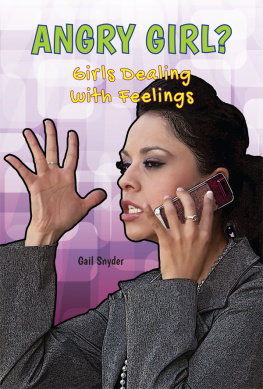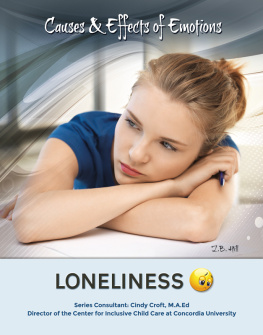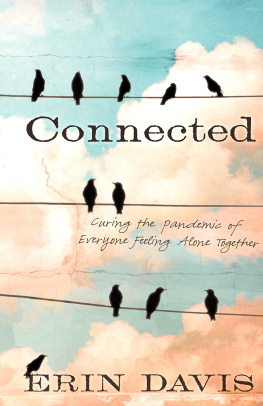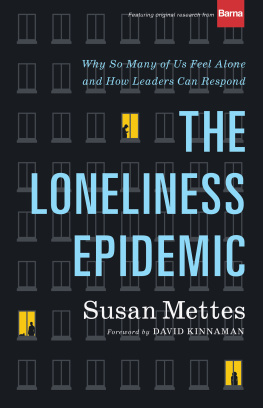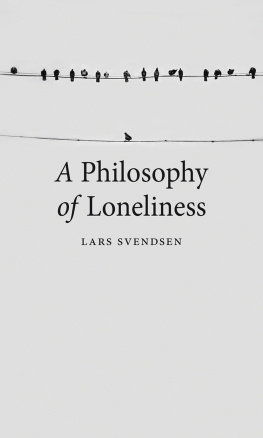Are You Lonely?
Besides taking an emotional toll, loneliness can cause physical problems, too. Studies show that lonely people have higher blood pressure, which can cause heart disease, than people who don't feel lonely. If you aren't a loner by choice, how can you cope? Using real-life examples and quotations, Lonely Girl? Girls Dealing With Feelings discusses the biological, emotional, and social effects of loneliness and provides research-based information on the best ways to overcome it. Take a quiz to find out if shyness is keeping you from making friends, and read tips on how to be more social.

Heather had moved during the summer, and it was her first week in a new school. She really missed Taraher best friend from her old neighborhood. And she missed the group of friends she used to eat lunch with every day. Although she sat with a couple of girls at lunchtime, Heather didnt know them very well. She felt miserable and alone, although she tried not to show it.
Its hard to feel alone and disconnected from other people. Such feelings can occur anywhere. Even though Heather was surrounded by other students in a crowded lunchroom, she was experiencing the painful feelings of loneliness.
Feeling lonely. Everyone has experienced loneliness at one time or another. It comes in different forms. Loneliness may be a mild feeling of boredom. Or it can be a vague sense of something missing. Sometimes, it can be a powerful feeling of emptinessof feeling forgotten, unneeded, or ignored by the rest of the world. Feeling lonely is a normal healthy emotion, although it can often hurt a lot.
When feelings of loneliness are mild, they typically last only a little while. You might feel bored or sorry for yourself, for example, if you are not invited to a certain party. Or you may be feeling lonely because youre new in the neighborhood and havent found a friend to talk to. But you may later find out the party wasnt much fun. Or you may start meeting new people. Then those feelings of loneliness will quickly vanish.
At other times, feelings of being disconnected may be strong. And they may go on for a long time. When a person experiences long-lasting feelings of isolation and loneliness, he or she is suffering from chronic loneliness. Long-lasting feelings of abandonment or rejection can lead to physical and emotional problems, including depression, anxiety, and resentment.
The need to connect. Everyone needs friends. In fact, psychologists have found that all human beings have a drive to be connected in social groups and to have close relationships. When these needs are not met, loneliness occurs. Researchers refer to two kinds of loneliness: social loneliness and emotional loneliness.
If you dont identify with or feel part of a group, you are dealing with social loneliness. This can happen if you have trouble making friends or are new to a neighborhood. You have no one to hang out with, go to the movies with, or regularly eat lunch with. Without social contact, it is difficult to form or maintain any strong relationships.
Emotional loneliness occurs when you dont have any close relationships with other people. A girl feeling emotional loneliness may long for a best friend or someone to date. Or she may wish to be closer to her parents or to another family member. With emotional loneliness, a girl believes that no one is there for her to share hurts and feelings. She has nobody to talk to, and so she keeps a lot of feelings inside.
Feeling lonely or choosing to be alone. If you think no one really cares about you, it can hurta lot! Thats why loneliness is known as a negative emotion. You feel bad about not having close friends or much social contact. When you feel lonely, you feel sad. You can experience other negative emotions, too, such as fear of the future or anger about being left out.
These negative feelings that accompany loneliness are very different from the feelings you can experience when you choose to be alone. When you have made a choice to be away from other people, you are seeking solitude. Solitude differs from loneliness because you are happy about the situation. You have chosen to take time to be by yourself in order to accomplish something positive. Without the distraction of other people, you can spend time doing what is important to you. You can think about your values and gain a better understanding of yourself.
Shyness and self-esteem. When you want to connect with others, however, your ability to form new relationships can be affected by your personality. If you are shy, for example, you typically feel apprehension or worry when meeting new people. As a result, you may feel lonely because you have a difficult time making friends.
Shyness, or discomfort in social situations, is common for many people. In fact, almost half the people in the United States describe themselves as shy. Although the majority of them manage to hide their nervousness when in unfamiliar situations, they still feel shy.
Shy people often have low self-esteem, which means they dont think very highly of themselves. They may keep an ideal image of what they should be in their head, even though they cant ever realistically achieve it.
For example, a girl with low self-esteem may be very self-critical, quick to refer to herself as worthless or stupid. She can have problems making friends because she doesnt think shes good enough to deserve a friend. Or she may think that others like her only because they want something she has. Because low self-esteem hinders her ability to form close friendships, she can suffer from emotional loneliness.
Changes in life. Shyness and low-self esteem arent the only factors that can influence whether you might feel loneliness. Changes in your life can also bring about periods of time when you feel isolated and alone. This is especially true if the change resulted in loss: the loss of a parent because of divorce, the loss of a friend because of a move, or the loss of a relationship because of a breakup. The death of a family member or friend can often lead to intense feelings of grief and loneliness.
Difficulties dealing with change can also occur within you. As a teen, you are in a time in life when a lot of physical and emotional changes are taking place. You are going through the changes of puberty, as your body matures. At the same time, you may be facing and dealing with pressures to do well at school or to fit in with friends. The stress of change can leave you struggling with feelings of loneliness.
Learning to cope. The first thing to keep in mind is that feeling lonely is normal. Most teenagers go through it. Youre not the only one out there who feels the way you do. Just because you feel lonely does not mean there is something wrong with you.
Whether you are feeling lonely because of a lack of friends or because of a sudden major change in your life, there are things you can do. This book includes information that can help you understand your feelings of loneliness. And it includes tips on what you can do to make things better, as well as ways to help others who also may be feeling the pangs of loneliness.

Loneliness can be a major source of stressthe mental or emotional strain that is the bodys reaction to an external force, situation, or change. Being stressed out can affect your health. You may have less energy, have trouble concentrating, and have frequent stomachaches, headaches, and muscle tension.


